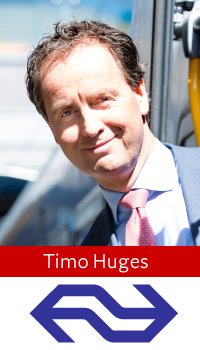'We should take the initiative for cooperation and improvements in the sector'

You studied Business Administration at the University of Groningen. What made you choose this particular degree programme?
I was interested in the business world. Given the choice between Economics and Business Administration, I decided that Business Administration was probably a broader-based programme. I could have gone to Rotterdam or Groningen, but preferred Groningen. I was allotted a place in the north; back to my ‘roots’.
How do you look back on your time at university?
It was one of the best periods of my life. A close community, where most people stayed at weekends too. The city has a great atmosphere, which is important at that point in your life. I was an active member of Vindicat, which is where I had my first experience of committee meetings. And it was great fun of course.
I still have plenty of contact with ‘Groningen’: with former flatmates, fellow-club members, old Groningen network clubs and as a member of the board of the UBBO Emmius Fund. Groningen still plays an important part in my life.
Which skills that you learned at university have proved to be most valuable in your current job?
The realization that you must work together with various types of people to achieve success and reach your goals. I also learned administrative skills – at least I had my first experiences in that area. Looking back, this is where I built a solid base for the work I do now.
You will be discussing the ‘3 Es’ in your presentation: eenheid, eenvoud and eigenaarschap (unity, simplicity and ownership). What do you mean by unity?
When I started in the railway sector, I soon realized that cooperation was the key to success. Comprehensive improvements for the benefit of Dutch train passengers can only be implemented if we cooperate with one another. We form one long chain. Passengers experience each journey separately; they travel from A to B, from door to door. They do not see it as a disjointed journey that starts with NS, continues with Arriva, then by bus or taxi and then...
How do you envisage cooperation with other parties?
It starts with one ticket for the entire public transport system. You check in at the start and check out at your destination. And good, up-to-date, clear travel information. Covering all the connections and means of transport, regardless of the company. Travellers want all these means of transport, timetables and services to connect smoothly. This should be our main focus for the next few years.
Simplicity is your second ‘E’. We must lose the current complexity. What needs to be made simpler?
At present, we are trying to simplify certain aspects of the internal organization within NS. Any company with so much history (175 years) will have developed unnecessarily complex processes and structures. Simplifying them would make it easier to reach agreement and make decisions, for example. And although our logistic staff are on top of their game every single day, I would still like to find ways of simplifying timetables so that we can change them more easily in response to unexpected situations. Public transport should be made a lot simpler for the passengers; we owe it to them.
And finally ownership. Why is this such an important factor?
This principle is one that is close to my heart. I want people to understand exactly where their responsibilities lie – in our case, with regard to passengers. NS is the largest company in the sector, which means that we have certain responsibilities. We should take the initiative for cooperation and improvements in the sector, and most importantly, in our customers’ journeys from door-to-door.
You say that you want to put passengers first. How do you intend to do this?
By putting the principles we have just discussed into practice. Together with everyone who works for NS and hopefully, everyone who works in the sector. By listening to our passengers, by always treating them with respect, and sometimes by being one step ahead of them. But also by being honest about what is going well and what isn’t. I am ambitious; I’ve already told the organization: things are going all right, but all right isn’t good enough. It’s not something that we should accept. We must not pat ourselves on the back because on average, a high percentage of trains arrive on time. No; we must set our sights on improving the lines that score below average. Our averages are no consolation to Ms Ramires or Mr Verhoek from Delft if their trains arrive late three times a week. In short, we must listen to our customers, stay close to the business and take concrete action.
| Last modified: | 25 January 2023 3.47 p.m. |
